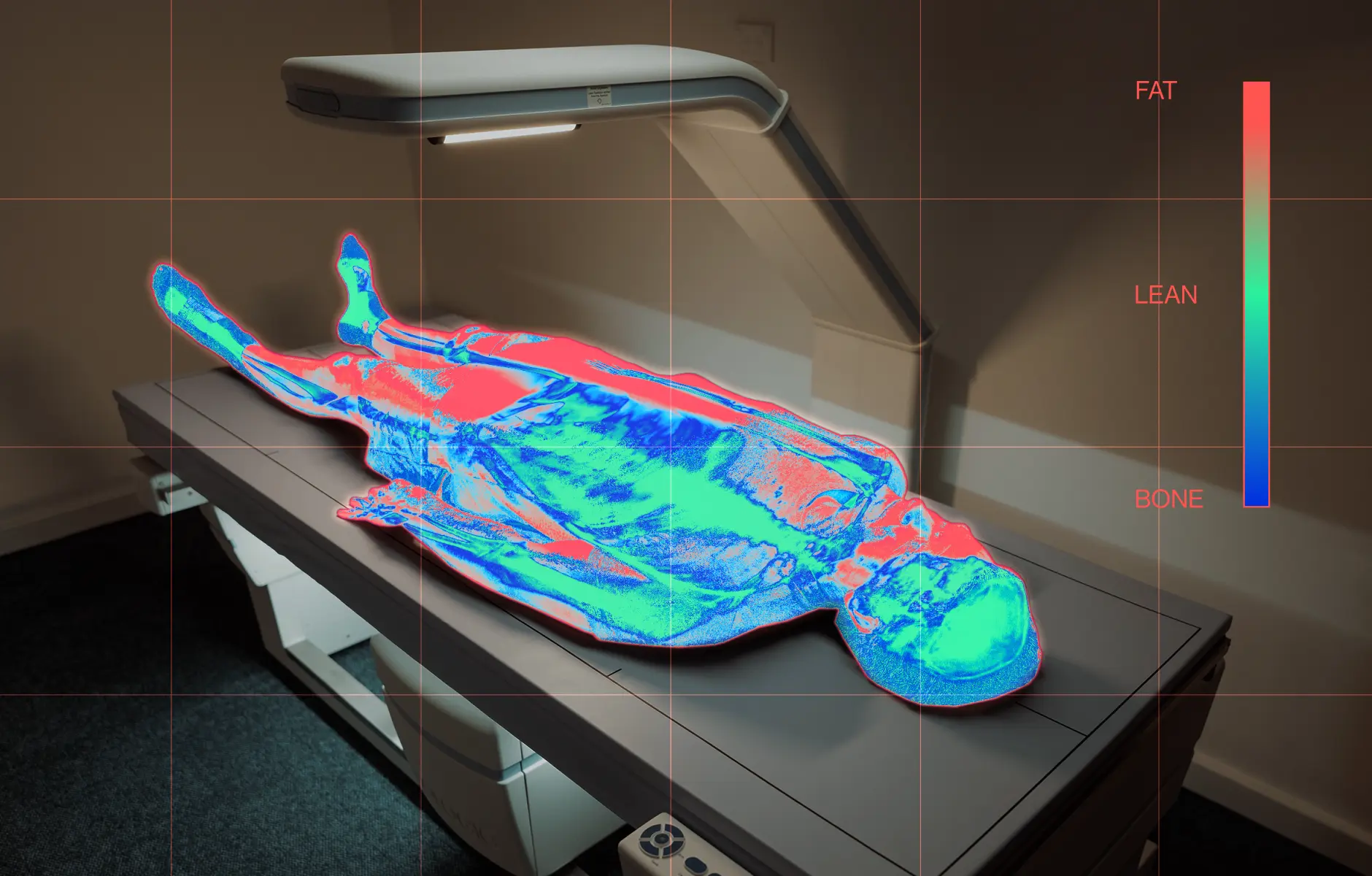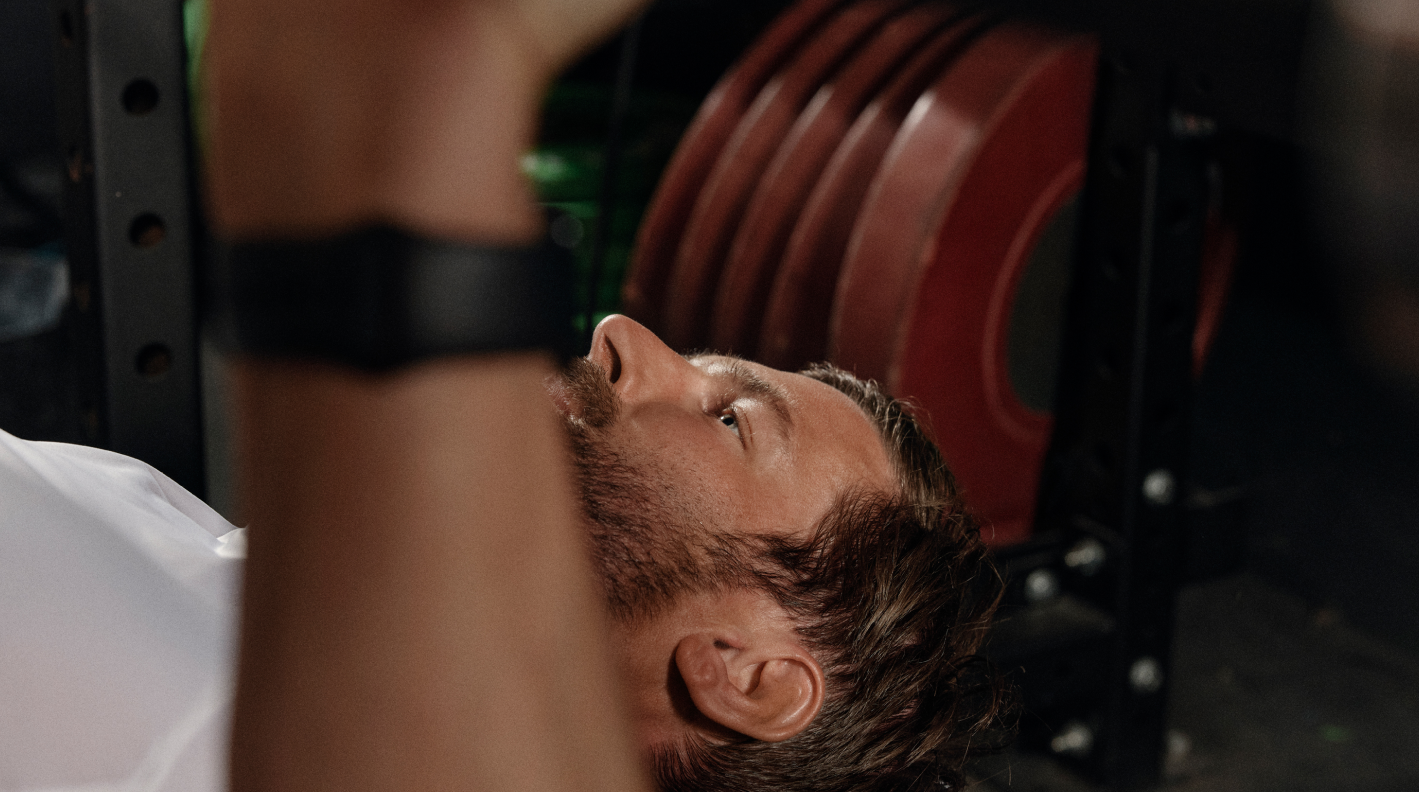How much does a DEXA scan generally cost?

Key takeaways
- DEXA scans provide precise measurements of body composition, bone density, fat mass, and muscle mass to guide health and fitness goals.
- Costs vary by region — around AU$120–150 in Australia, US$150–300 in the US, and £95–300 in the UK — with limited insurance or Medicare coverage.
- Compound uses DEXA scans as part of its diagnostic program to deliver tailored health, performance, and longevity plans backed by science.
To achieve peak performance, meet your fitness goals and truly understand your body, it's essential to track your health metrics.
While sports-oriented smartwatches and fitness trackers can provide a daily snapshot of our health at a glance, to gain understanding and see long-lasting results, you need to turn to science for the best intel.
This is where the DEXA scan comes in — this diagnostic tool measures body composition, bone mineral density, fat mass and muscle mass. Why is this important? Well, understanding your body composition allows you to create your health and exercise goals around this data, which in turn helps you enhance your performance.
But the bigger question is, what does it cost to peek inside the biological nutshell DEXA scans are equipped to crack open? This is what you need to know about the cost of this diagnostic tool.
What is a DEXA scan?
DEXA scans (dual-energy X-ray absorptiometry) use low-dose X-rays to diagnose bone health and density — this is what a DEXA scan is generally used for in a traditional healthcare setting.
But, DEXA scans also serve a dual purpose by offering insights into body fat levels and lean mass distribution, which can be used in a preventative healthcare capacity — this is how we use DEXA scans in our Compound program.
This DEXA data can be used as a roadmap for those seeking to understand their body composition, allowing you to determine where you need to spend your time and energy to improve your health. It also allows you to track the impact of your fitness and health routines, as you can see your gains and losses of fat or muscle in minute detail.

DEXA scan vs bone scan
It can be easy to confuse a DEXA scan with a bone scan, but they are quite different [1]. A bone scan involves imaging testing that’s used to examine any irregularities in the bone that could indicate infection or cancer.
In contrast, a DEXA scan specifically measures bone density, which is then used to determine an individual’s risk of developing osteoporosis or osteopenia.
The benefits of DEXA scans
In a traditional healthcare setting, DEXA scans allow medical professionals to diagnose conditions like osteoporosis and osteopenia, which often present no symptoms and are hard to otherwise diagnose before the presence of a fracture or broken bone [2].
If we swap this lens to a preventative healthcare one, we can use this technology to improve and optimise our health, which in turn, contributes to longevity.
Detailed body composition analysis
A DEXA scan provides a detailed analysis of body composition, including body fat percentage and lean muscle mass. This is extremely beneficial for those looking to work towards specific health goals or body composition, while it can also be used to inform workout programs and nutritional plans.
Monitors change to bone health
Whether it’s ageing, medication, even certain cancer treatments, or changes to hormones, our bone mass can be affected by a range of factors. A DEXA scan helps to monitor changes and the effects of such treatments or health concerns on bone density throughout a specific period.
Superior accuracy
The accuracy of a DEXA scan far surpasses that of any smartwatch or fitness tracker. If you’re looking to hit your fitness goals, you need results that can accurately inform your training and eating plan, which is exactly what a DEXA scan offers.
Non-invasive procedure
The process of getting a bone densitometry scan is quick and painless, with the whole thing taking 10-20 minutes. Iit's recommended that you stop taking any calcium supplements the day before and be sure to wear loose-fitting clothing without zippers or metal details on the day of the scan.
How much does a DEXA scan cost?
The cost of a DEXA body scan generally depends of where you live and the clinic or practice offering the service and whether it includes a review of your results with a health professional following the scan.
Australia
In Australia, you can typically expect to pay around AU$120 to AU$150 for a DEXA scan. In some instances, this can be higher, particularly when using the results include the crafting a workout or nutrition plan on your behalf.
Australians might be wondering if Medicare covers the cost of DEXA body scans and the answer is yes — only in instances where patients meet the criteria, which can be discussed with your referring doctor [3].
You may be eligible for an annual bulk billed DEXA whole body scan with a Medicare rebate if you are experiencing:
- Prolonged glucocorticoid therapy
- Any condition associated with excess glucocorticoid secretion
- Male hypogonadism
- Currently taking Prednisolone or corticosteroid treatments and have done so for over 4 months
- Low testosterone in males
- Have been diagnosed with osteoporosis and have had significant changes to treatment regarding the class of drugs
Patients who are covered by Medicare for a DEXA scan every 24 months include those who have:
- Broken bones or fractures in the last 10 years caused by minimal trauma
- Monitoring proven low bone density (osteoporosis) from previous DEXA or CT scans with a T score of -2.5 or less
- Patients diagnosed with rheumatoid arthritis, chronic liver or kidney disease, hepatitis, Crohn’s, Coeliac, Graves, Hashimoto’s, malabsorptive disorders or an overactive thyroid
- Patient aged 70 or older and has a T-score from previous BMD between -1.5 and -2.4
Those who are covered by Medicare for a DEXA scan every 5 years include the following:
- Patients 70 years or older who have not previously had a BMD examination (initial scan)
- Patients who have a T-score from a previous BMD of -1.5 and above
United States
Where you undergo a DEXA body composition scan largely dictates how much you're likely to pay in the United States. Typically, this figure ranges between US$150 to US$300 per scan.
Your health insurance may cover a DEXA scan if it's prescribed by a doctor in order to diagnose or manage bone density problems. But, more often than not, these scans are considered elective or preventative and as such, you'll have to pay out of your own pocket.
United Kingdom
Unsurprisngly, in the United Kingdom, the cost of a DEXA scan also depends on the provider, with prices ranging from £95 to £300.
For those with suspected bone density or bone mass issues, your doctor or health professional can refer for you for a DEXA scan on the NHS [4]. For this to happen, your doctor will need to assess your risk of osteoporotic fragility fractures — this refers to when your bones become weakened by osteoporosis and a minor bump or fall could cause them to break [4].
But, if you're undergoing a scan to understand your body composition, this will generally require you to go through a private clinic and the cost will be yours to cover.
What makes a DEXA scan worthwhile?
Put simply: precision. One-size doesn't fit all when it comes to health and with a DEXA scan, you're able to buy precision and leave the guesswork at the door. This tool is invaluable for those looking to go beneath the skin to gain a comprehensive analysis of their health.
And, once you have the data, this is yours to keep. Your report includes breakdowns of fat percentages and lean mass distributions, which you can use for early interventions, to create tailored approaches to health management and to benchmark your health going forward.
DEXA data allows you to target very specific health and fitness goals based on your lean tissue mass and visceral fat — no more flying blind when it comes to eating and exercise.
Gaining detailed and accurate data on body composition is not just for elite athletes but for anyone seeking a more profound understanding of their physical being. This is why we use DEXA scans as part of our diagnostics at Compound, to tailor health interventions and treatments to each individual.
What is Compound, exactly? Well, we're a digital clinic for performance health. Once the exclusive domain of billionaires and Hollywood stars, we're on a mission to make premium concierge care accessible to every man who wants more.
We take a multi-disciplinary approach to health optimisation and preventative care to help men unlock barriers to everyday performance.
We are integrating diagnostics (bloodwork, scans, etc), treatment (medication, supplementation), performance programming, and support (coaching, accountability, care) — wrapped around a growth mindset.
Our team of dedicated healthcare professionals and expert specialists are here to help you access the future of proactive healthcare, today.
To achieve peak performance, meet your fitness goals and truly understand your body, it's essential to track your health metrics.
While sports-oriented smartwatches and fitness trackers can provide a daily snapshot of our health at a glance, to gain understanding and see long-lasting results, you need to turn to science for the best intel.
This is where the DEXA scan comes in — this diagnostic tool measures body composition, bone mineral density, fat mass and muscle mass. Why is this important? Well, understanding your body composition allows you to create your health and exercise goals around this data, which in turn helps you enhance your performance.
But the bigger question is, what does it cost to peek inside the biological nutshell DEXA scans are equipped to crack open? This is what you need to know about the cost of this diagnostic tool.
What is a DEXA scan?
DEXA scans (dual-energy X-ray absorptiometry) use low-dose X-rays to diagnose bone health and density — this is what a DEXA scan is generally used for in a traditional healthcare setting.
But, DEXA scans also serve a dual purpose by offering insights into body fat levels and lean mass distribution, which can be used in a preventative healthcare capacity — this is how we use DEXA scans in our Compound program.
This DEXA data can be used as a roadmap for those seeking to understand their body composition, allowing you to determine where you need to spend your time and energy to improve your health. It also allows you to track the impact of your fitness and health routines, as you can see your gains and losses of fat or muscle in minute detail.

DEXA scan vs bone scan
It can be easy to confuse a DEXA scan with a bone scan, but they are quite different [1]. A bone scan involves imaging testing that’s used to examine any irregularities in the bone that could indicate infection or cancer.
In contrast, a DEXA scan specifically measures bone density, which is then used to determine an individual’s risk of developing osteoporosis or osteopenia.
The benefits of DEXA scans
In a traditional healthcare setting, DEXA scans allow medical professionals to diagnose conditions like osteoporosis and osteopenia, which often present no symptoms and are hard to otherwise diagnose before the presence of a fracture or broken bone [2].
If we swap this lens to a preventative healthcare one, we can use this technology to improve and optimise our health, which in turn, contributes to longevity.
Detailed body composition analysis
A DEXA scan provides a detailed analysis of body composition, including body fat percentage and lean muscle mass. This is extremely beneficial for those looking to work towards specific health goals or body composition, while it can also be used to inform workout programs and nutritional plans.
Monitors change to bone health
Whether it’s ageing, medication, even certain cancer treatments, or changes to hormones, our bone mass can be affected by a range of factors. A DEXA scan helps to monitor changes and the effects of such treatments or health concerns on bone density throughout a specific period.
Superior accuracy
The accuracy of a DEXA scan far surpasses that of any smartwatch or fitness tracker. If you’re looking to hit your fitness goals, you need results that can accurately inform your training and eating plan, which is exactly what a DEXA scan offers.
Non-invasive procedure
The process of getting a bone densitometry scan is quick and painless, with the whole thing taking 10-20 minutes. Iit's recommended that you stop taking any calcium supplements the day before and be sure to wear loose-fitting clothing without zippers or metal details on the day of the scan.
How much does a DEXA scan cost?
The cost of a DEXA body scan generally depends of where you live and the clinic or practice offering the service and whether it includes a review of your results with a health professional following the scan.
Australia
In Australia, you can typically expect to pay around AU$120 to AU$150 for a DEXA scan. In some instances, this can be higher, particularly when using the results include the crafting a workout or nutrition plan on your behalf.
Australians might be wondering if Medicare covers the cost of DEXA body scans and the answer is yes — only in instances where patients meet the criteria, which can be discussed with your referring doctor [3].
You may be eligible for an annual bulk billed DEXA whole body scan with a Medicare rebate if you are experiencing:
- Prolonged glucocorticoid therapy
- Any condition associated with excess glucocorticoid secretion
- Male hypogonadism
- Currently taking Prednisolone or corticosteroid treatments and have done so for over 4 months
- Low testosterone in males
- Have been diagnosed with osteoporosis and have had significant changes to treatment regarding the class of drugs
Patients who are covered by Medicare for a DEXA scan every 24 months include those who have:
- Broken bones or fractures in the last 10 years caused by minimal trauma
- Monitoring proven low bone density (osteoporosis) from previous DEXA or CT scans with a T score of -2.5 or less
- Patients diagnosed with rheumatoid arthritis, chronic liver or kidney disease, hepatitis, Crohn’s, Coeliac, Graves, Hashimoto’s, malabsorptive disorders or an overactive thyroid
- Patient aged 70 or older and has a T-score from previous BMD between -1.5 and -2.4
Those who are covered by Medicare for a DEXA scan every 5 years include the following:
- Patients 70 years or older who have not previously had a BMD examination (initial scan)
- Patients who have a T-score from a previous BMD of -1.5 and above
United States
Where you undergo a DEXA body composition scan largely dictates how much you're likely to pay in the United States. Typically, this figure ranges between US$150 to US$300 per scan.
Your health insurance may cover a DEXA scan if it's prescribed by a doctor in order to diagnose or manage bone density problems. But, more often than not, these scans are considered elective or preventative and as such, you'll have to pay out of your own pocket.
United Kingdom
Unsurprisngly, in the United Kingdom, the cost of a DEXA scan also depends on the provider, with prices ranging from £95 to £300.
For those with suspected bone density or bone mass issues, your doctor or health professional can refer for you for a DEXA scan on the NHS [4]. For this to happen, your doctor will need to assess your risk of osteoporotic fragility fractures — this refers to when your bones become weakened by osteoporosis and a minor bump or fall could cause them to break [4].
But, if you're undergoing a scan to understand your body composition, this will generally require you to go through a private clinic and the cost will be yours to cover.
What makes a DEXA scan worthwhile?
Put simply: precision. One-size doesn't fit all when it comes to health and with a DEXA scan, you're able to buy precision and leave the guesswork at the door. This tool is invaluable for those looking to go beneath the skin to gain a comprehensive analysis of their health.
And, once you have the data, this is yours to keep. Your report includes breakdowns of fat percentages and lean mass distributions, which you can use for early interventions, to create tailored approaches to health management and to benchmark your health going forward.
DEXA data allows you to target very specific health and fitness goals based on your lean tissue mass and visceral fat — no more flying blind when it comes to eating and exercise.
Gaining detailed and accurate data on body composition is not just for elite athletes but for anyone seeking a more profound understanding of their physical being. This is why we use DEXA scans as part of our diagnostics at Compound, to tailor health interventions and treatments to each individual.
What is Compound, exactly? Well, we're a digital clinic for performance health. Once the exclusive domain of billionaires and Hollywood stars, we're on a mission to make premium concierge care accessible to every man who wants more.
We take a multi-disciplinary approach to health optimisation and preventative care to help men unlock barriers to everyday performance.
We are integrating diagnostics (bloodwork, scans, etc), treatment (medication, supplementation), performance programming, and support (coaching, accountability, care) — wrapped around a growth mindset.
Our team of dedicated healthcare professionals and expert specialists are here to help you access the future of proactive healthcare, today.












